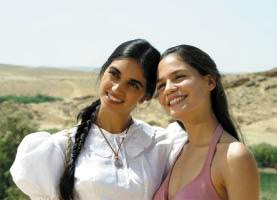Best Picture: Brokeback Mountain
Capote
Crash
Good Night, and Good Luck
Munich
Did you notice that all five films begin with letters at or before the letter 'M'? I've sometimes felt that films with letters closer to the beginning of the alphabet do slightly better, because they sit closer to the top of movie listings and such. Interestingly, every Best Picture Winner since the year 2000 has also started at or before 'M': Million Dollar Baby, Gladiator, A Beautiful Mind, Lord of the Rings. (In the 1990s, the ratio of A-M and N-Z is 1 to 1)
I'm not really sure who's going to win -- I haven't seen Crash or Munich. But I saw the other three, and I can't see the award going to Good Night, and Good Luck, because it's such a small film (Oscar likes big and sweepy). And Capote is too cold and amoral (Oscar likes a moral, and Capote questions about the viability of the death penalty is arguable). Because I read so many mixed reviews of Crash, my money's on Munich or Brokeback Mountain. While most people are predicting Brokeback Mountain because of all the hype this spring, it's always dangerous to bet against Stephen Spielberg...
It's possible that Best Picture will go to Brokeback Mountain, while the Best Director award will go to Spielberg and Munich.
On Documentaries, I did recently watch Murderball (the film about quadroplegic rugby players), which is a long-shot against March of the Penguins, but a damn good documentary nonetheless. I'm also trying to figure out how Werner Herzog's Grizzly Man wasn't nominated; that is a really brilliant and philosophically challenging film.
I have a gut feeling that Capote will win Best Adapted Screenplay, because it's a movie about a writer on the verge of greatness, and films about writers writing tend to ring the "well-written" bell, if you see what I mean. Capote should also win for Phillip Seymour Hoffmann in the Best Actor. (Best Actress is harder to read, isn't it? Reese Witherspoon was good in Walk the Line, but it was a pretty conventional role. Hard to compare her to more radical roles like Judi Dench in Mrs. Henderson Presents or Felicity Huffman in Transamerica)
I haven't seen any of the Foreign Films this year, though I would encourage the committee in India who chooses which films to select to send to the Academy for pre-nomination to look carefully at the films on this list. Note that none of them look anything like Paheli! I get the feeling that the government committee is a bit cut off from the rest of the world. Something like 15 Park Avenue might have had more of a chance; mostly the official Indian submissions tend to be pretty ridiculous choices.
* * * *

Now to be just a little more serious.
In a couple of weeks, I'm going to be on a panel at Lehigh talking about a recent Israeli film called Turn Left at the End of the World (also see IMDB).
The film is about the interaction between Indian and Moroccan immigrants to Israel in the 1960s. Beginning as early as 1949, Indian Jews were invited to 'return' to Israel, and the immigrants placed by the Israeli government in rural settlements, often based on where they came from in India. Jews from the Bene Israel community in Bombay tended to end up in a desert town called Beersheva (where they struggled), while Cochin Jews tended to go to more agriculturally-friendly places in other parts of the country (where they prospered). There are now about 60,000 Bene Israel Indians in Beersheva, with less than 5000 remaining in Bombay.
I got to watch a preview copy of Turn Left at the End of the World last night, and it is actually a lot of fun; it stars a well-known Indian actor named Parmeet Sethi, as well as some actual Indian Israelis (Liraz Charchi, pictured above, is particularly impressive as Sarah Talkar). Judging from some articles I've been reading, the film's portrayal of the integration of the Bene Israel Jews in Beersheva in the later 1960s is probably a little too upbeat. In real life, the Indian Jewish communities tended to remain somewhat segregated from the mainstream of Israeli society, and the Bene Israel community in particular had to struggle to get official recognition as proper Jews. But that's a quibble; if you see this film playing anywhere, definitely go see it.
Does anyone have any recommendations for further reading on Indian Jews, either in India or Israel?
(Oh, and what are your Oscar picks and why?)